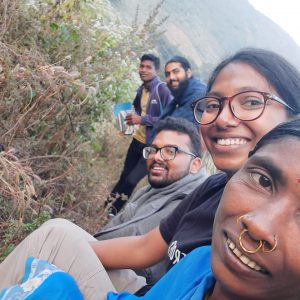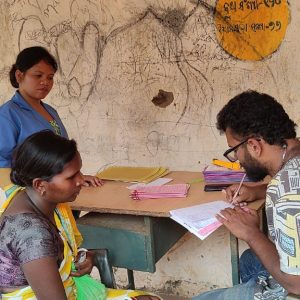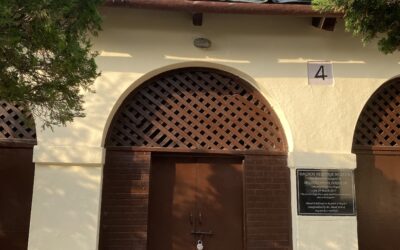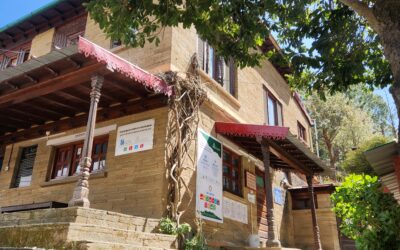Not everyone decides to work with organisations that attend to particularly vulnerable tribal groups in highly inaccessible areas, but for those who do, what drives them? What is their sense of purpose? Of meaning in work? Working with Swasthya Swaraj at Kalahandi, Odisha, for the past few months has given me a glimpse of the motivation that drives social workers, healthcare professionals and volunteers to contribute their skill sets in one of the poorest parts of India. This is of course based upon my experiences and should not be generalised even over other organisations working in similar areas, and/or with the same communities.
One reason that made me interested in digging deeper on this was a sense of helplessness that I felt when I first reached our field areas, not being able to speak or understand the language, and quite literally appearing to be from a different planet. I came as a fellow, and felt this way even when the setup was made favourable for me. So I cannot even imagine what our founder and executive director, Dr. Aquinas would have felt when she left everything to start a primary health program in a place where ‘hunger deaths’ were still common.
The entrance to our office helped me a little, which has a large image of M.K. Gandhi with his Talisman, that in essence urges one to first address the most under privileged in the society and then move forward. Coming from a privileged background, and from a state that leaves behind all other states in development indices (Kerala), I can see why Dr. Aquinas would feel that she is not attending to the poorest of the poor if she had decided to work in her hometown. Starting a program in a place where nothing similar has been started before (and extremely few initiatives on the whole), has its own thrill and sense of achievement which is well deserved.
People are more forgiving here, as lesser promises have been made to them, and tribal culture has preserved an environment of respect and safety, that’s seldom found in urban or even semi-rural contexts.

However, everyone in the organisation does not feel the same way, especially since a lot of our staff belongs to the community that we work with. During a training that I conducted, I asked our field animators, who are responsible for looking over village level health workers, what their motivation for working in such an organisation was. I asked them why healthcare? Why work with the community rather than just providing an external service. Some of them responded that they really enjoyed meeting new people, connecting with them and knowing about the place in a much deeper way. They said that earlier, they used to know only a few villages, and that too not in much depth. Now, they have friends and a place to stay at night in each of the villages we are working in.
On probing more about their future, and if they have any personal goals, they said that they would like to study further, work at a higher level of management. One of them even expressed that initially, he thought that this work wasn’t for him, and not even effective. However, many of these notions changed as he grew with the organisation, being a part of it from the beginning when everything was crude, and an unchartered territory.
Being the direct representatives of the community that we work with, they feel the most responsible when it comes to the image of the organisation. In the end, it is them who have to face the people if expectations are not met. They are the ones who are constant, while many will work for some time and leave. Working at Swasthya Swaraj is their primary economic occupation, and they know that they could be earning more otherwise, as most of them have previously migrated to Kerala and Vijaywada, but this job allows them to stay close to home and meet new people every day.

While the founders and the local people make up a majority of our employees, there exists a third group, consisting of fellows, volunteers and interns. All these positions do not have any long-term commitments, and the motivation is also based upon personal development in a form of exploration and learning. We have two doctors in our organisation including Dr. Aquinas, and Dr. Nithin, who is here for about 4 months. His motivation is to explore the unexplored, push himself out of his comfort zone, learn and experience different cultures. Being a doctor is just a way in which he can involve himself in these activities. One day, he even sees himself working in organisations that are not involved in healthcare.
While Dr. Nithin has relatively less time with the community, I see him immerse himself fully and experience the good and the bad first-hand. He is working not for the sake of it and calls himself a “work in progress”, even though he already has years of experience in his professional field. He plans to further go on to get a specialised medical degree. However, nothing is certain, not even the events of the coming week!
I am glad that I am able to work with an organization that has people with such a diverse range of interests, skills and motivations for work. The diversity is embraced and a sort of freedom is given that lets everyone express themselves. Also, the values of the organization are strong, and people with similar ideologies and views tend to join as it is too isolated for a commercial high paying job.
As for myself, my motivation has been primarily to learn and work with people who are fighting for something bigger than themselves. I know that these experiences will make me more wholesome, and sensitive to differences and working with uncertainty. As my time in the community grows, so does my confidence and comfort with people and their culture. I hope to some day be able to give back as much the organization has given me.




0 Comments